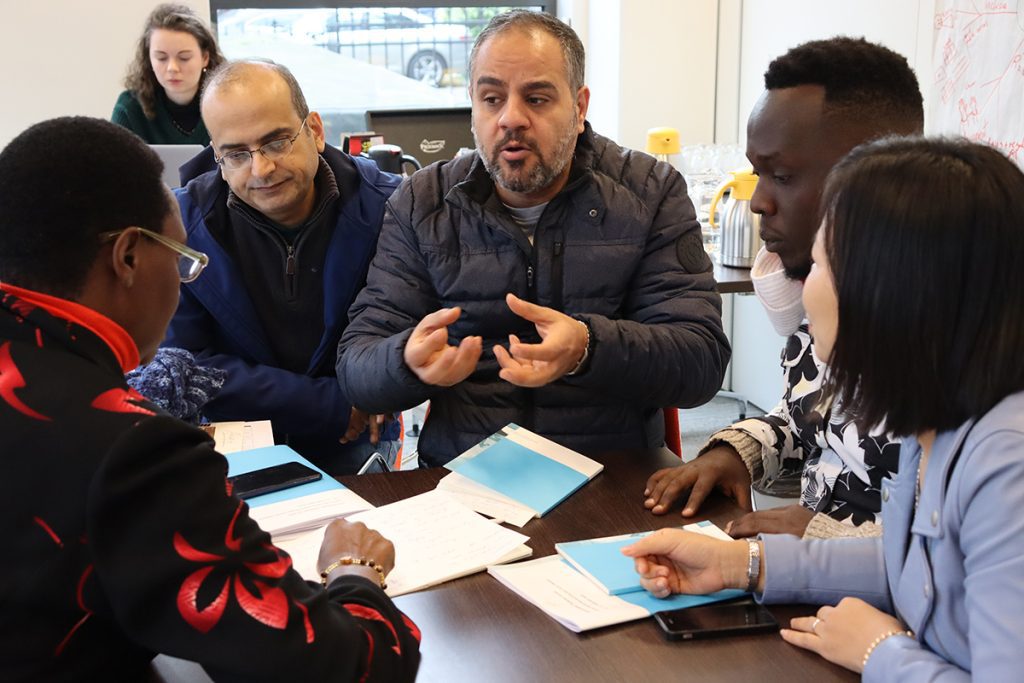In 2011, millions of Egyptians went to the streets to ask for more democracy. Since then, they have witnessed three different regimes and unfinished reforms to Egypt’s local administration. Ahmed M. Kodair, local development advisor to the Ministry of Local Development, joined our Fiscal Decentralisation and Local Finance course in 2020. He explains the strides and progress made in his country so far.

Ahmed Kohdair with fellow participants during group exercise. Course Fiscal Decentralisation & Local Finance, 2020.
Where are the Local Councils?
Egypt is divided into 27 governorates further divided into city regions, cities, districts, and villages. At all levels, these local units are governed by elected Local Popular Councils (LPCs) that supervise all utilities and decisions made by the executive councils. The executive councils are appointed by the central government. In this context, the local councils have not had much power to govern since they need approval for all their actions from the centrally appointed executives.
The 2012 constitution that was drafted following the Egyptian Revolution generated hope for more autonomy for elected LPCs. At this point, Egypt had not held an election for local councils since 2008, but the 2012 constitutions failed to ratify, and in the resulting political uncertainty, the remaining LPCs were disbanded. Despite being mentioned in the legislature since then, working LPCs have not returned. According to Ahmed, the problem is that “even local civil servants and academics do not understand how the governance of local structures works”.
Ahmed describes the many challenges at the local level, such as an unclear division of responsibilities and weak capacities to manage funds at all levels. Also, some regions are given more attention than others. When it comes to water management, which is left to governorates, poor governance becomes a risk.
“Now, there is a static, complex, and disrupted local administration structure which has negatively affected service delivery at the local level. This situation causes a decline in social welfare as the basic needs of the locals are not met, while social opportunities are minimised”.
At The Hague Academy
“Through this training, I hoped to gain a deeper understanding of fiscal decentralisation and local finance, which I would use in modernising the training manual on local administration reform, thus raising awareness among trainees on fiscal decentralisation, specifically for the provision of local services such as water”.
In The Hague, Ahmed intended to learn how to better train and teach about decentralisation. This would enable him to help local NGOs advocate for fiscal decentralisation in the water management sector and develop community initiatives and dialogues.
At this time, Ahmed was also writing a policy paper where he included the different best practices and policy options he gathered in The Hague. He later delivered it to policymakers so that they could “quickly adopt reforms in local water management funding” based on the techniques and experiences he shared. In particular, lessons on participatory budgeting and municipal financing influenced his recommendations.
Back Home Action Plan – Spreading the Word
When Ahmed returned to Egypt, he incorporated the principles he learned at The Hague Academy into his local development courses. He also invited several of his students to link local reform and tourism in their graduation theses, hoping to generate fresh information and thoughts on the issue.
“Five students have done that, and two of them worked later on reforming local administration in their master theses”.
Ahmed continued to work as a trainer at the Local Development Centre (Saqqara), integrating and translating The Hague Academy’s course handbook into Arabic. He then prepared a policy paper and a research study on local government reform in Egypt. His thoughts made an impression.
“Thanks to this course, I work now as a local development advisor to the Ministry of Local Development. The course helped me acquire knowledge on local spending, and how local spending flows and distributes between different governance layers”.
Moving forward, Ahmed hopes to see the restoration of legitimately elected local councils, accompanied by democratic elections throughout the country. With more adequate representation, he wishes to see true reform and better local governance in Egypt.
Join our course on Fiscal Decentralisation and Local Finance!
Are you interested in the principles of financial accountability and transparency, and in exchanging examples of inclusive and participatory budgeting? Keep an eye out for our Fiscal Decentralisation and Local Finance Course.
Related courses
We offer a diversity of courses throughout the year. Here are several other courses you might like.

